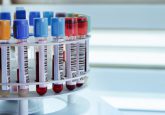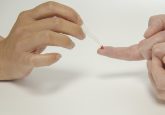Silk matrix encapsulation technique may stabilize blood samples for longer periods

Scientists at Tufts University (MA, US) have engineered a silk matrix technique that stabilizes blood samples for long periods of time without the need for cold storage. The newly developed method was recently presented in a paper published in the Proceedings of the National Academy of Sciences.
The group of researchers discovered forming a silk solution with blood samples stabilize blood samples despite temperature regulation. The team formed a solution consisting of silk fibroin protein and blood samples.
The solution was then left to air dry and then stored at a range of temperatures varying between 22 and 45 degrees C. They found the silk protein formed a solid matrix enveloping blood analytes, thus stabilising the blood sample. Samples were easily retrieved and analysed by dissolving in water.
“This approach should facilitate outpatient blood collection for disease screening and monitoring, particularly for underserved populations, and also serve needs of researchers and clinicians without access to centralized testing facilities. For example, this could support large-scale epidemiologic studies or remote pharmacological trials,” stated senior author David L. Kaplan.
Medical diagnostic and clinical research requires accurate analysis of biofluids. The method of storage and collection of these samples are decisive factors in acquiring accurate and reliable results.
Without correct temperature regulation, biomarkers present in blood sample can deteriorate thus compromising the reliability of results obtained from lab analysis.
Current methods have been unsuccessful at preserving biomarkers in blood samples from denaturing when refrigeration is not possible. Though techniques such as drying blood on paper are workable, they have a number of limitations, primarily in the small sample size required and also in failing to protect samples from thermal damage.
The team are hopeful this new method will overcome the inadequacies faced when utilizing existing techniques, particularly in enhancing sample preservation.
“We found that biomarkers could be successfully analyzed even after storage for 84 days at temperatures up to 113 degrees F. Encapsulation of samples in silk provided better protection than the traditional approach of drying on paper, especially at these elevated temperatures which a shipment might encounter during overseas or summer transport,” commented Jonathan A. Kluge, co-first author of the paper.
Researchers are optimistic this new approach could possibly transform the way we collect biospecimens, paving the way for new procedures of temperature-independent diagnostics.
Source: Kluge JA, Li AB, Kaplan DL, et al. Silk-based blood stabilization for diagnostics. PNAS doi: 10.1073/pnas.1602493113 (2016); Tufts University Press Release





